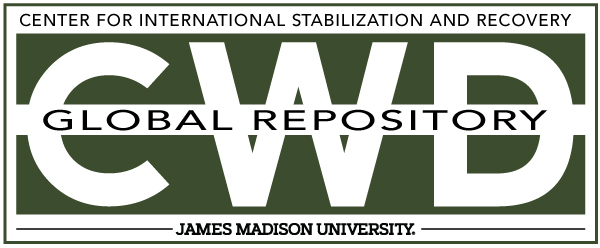Document Type
Article
Creative Commons License

This work is licensed under a Creative Commons Attribution-Noncommercial-No Derivative Works 4.0 License.
Publication Date
1-20-2006
Keywords
Advocacy and International Law, Victim Assistance, Sudan Civil War, Nuba Mountains, Jim Freedman Consulting, SLIRI
Abstract
From its inspired beginnings in 2001, the Sudan Landmines Information and Response Initiative (SLIRI) has had the potential to become an influential mine action organization with the capacity to use the mine action platform for engaging Sudan's adversaries in a peacebuilding dialogue. It is the only non-partisan indigenous organization in thecountry. Its first location – or Sector Operations Centre (SOC) as the site offices have been called - and the most innovative has been in the Nuba Mountains, where shortly after the cease-fire in January 2002 SLIRI first introduced two offices working in tandem on either side of the conflict line for collecting information about victims and mined areas. Information was collected by pairs of field workers drawn from both sides of the conflict. From the Nuba Mountains, SLIRI expanded, establishing 15 Sector Operation Centres (SOCs) throughout the country as the programme grew, operating simultaneously
in Government controlled areas and SPLM controlled areas. Its ultimate ambition was to have SOCs in all major areas of the country with sub-sector locations where basic landmine surveys would contribute to protecting the population and to assisting mine clearance in setting priorities.
This evaluation report argues that Landmine Action and other associated international partners should take measures to rescue SLIRI from its present decline, to resurrect SLIRI's reputation with UNMAS and to mend fences with the Government as it continues to seek official recognition. The EC continues to actively support registration for SLIRI, a sign that the EC maintains an interest in supporting the SLIRI ideal. The fact that SLIRI no longer functions in the way it was envisaged does not mean it should not do so or that it was not a good idea or that it did not do well. It has done well even if its present circumstances are poor testimony. SLIRI functioned well in Phase I of European Community funding and continued to function well, against some odds, in 2004 during
the first year of the European Community's Phase II funding. Its accomplishments are considerable especially considering the difficulties experienced in providing data according to UNMAS' standards. A neutral, national indigenous organization is a viable and feasible ideal, and even if these first three and a half years have had disappointments, they have provided lessons for avoiding the risks that a non-partisan, national institution must navigate if it is to serve as a platform for implementing a peacebuilding campaign through mine action.
Included in
Defense and Security Studies Commons, Peace and Conflict Studies Commons, Public Policy Commons, Social Policy Commons



